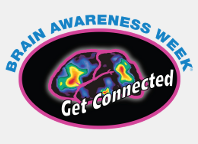Published: March 16, 2009
 Brain Awareness Week (BAW) is a series of events held around the world to increase public awareness about the brain.
Brain Awareness Week (BAW) is a series of events held around the world to increase public awareness about the brain.
Brain Awareness Week (BAW) is an international campaign dedicated to advancing public awareness about the progress and benefits of brain research. Founded and coordinated by the Dana Alliance for Brain Initiatives and its sister organization, the European Dana Alliance for the Brain, BAW is now entering its fourteenth year as a catalyst for public understanding of brain science. The Dana Alliances are joined in the campaign by partners from around the world, including universities, hospitals, patient groups, government agencies, schools, service organizations, and professional associations.Â
For more information of Brain Awareness week events around the world click here
Source: The Dana Foundation
Published: March 15, 2009
 An obsession with children’s self esteem is breeding narcissism, says Dr Carol Craig, chief executive of The Centre for Confidence and Wellbeing in Glasgow. Dr Craig called the self-esteem agenda, which has been imported from the United States, a “fashionable idea” that has gone too far and urged schools to reclaim their role as educators, not psychologists. In today’s Telegraph Urmee Khan reviewws Dr. Craigs speech at the Association of School and College Leaders conference in Birmingham. Link to continue reading
An obsession with children’s self esteem is breeding narcissism, says Dr Carol Craig, chief executive of The Centre for Confidence and Wellbeing in Glasgow. Dr Craig called the self-esteem agenda, which has been imported from the United States, a “fashionable idea” that has gone too far and urged schools to reclaim their role as educators, not psychologists. In today’s Telegraph Urmee Khan reviewws Dr. Craigs speech at the Association of School and College Leaders conference in Birmingham. Link to continue reading
Source: The Telegraph
Published: March 14, 2009
With Mother’s Day, Father’s Day and high school and college graduations upcoming, there will be plenty of gift-giving and well wishes. When those start pouring in, let yourself be grateful the best way to achieve happiness according to several new studies conducted by Todd Kashdan, associate professor of psychology at George Mason University.
Gratitude, the emotion of thankfulness and joy in response to receiving a gift, is one of the essential ingredients for living a good life, Kashdan says. Kashdan’s most recent paper, which was published online this week at the Journal of Personality, reveals that when it comes to achieving well-being, gender plays a role. He found that men are much less likely to feel and express gratitude than women. [continue reading…]
Published: March 14, 2009
Women tend to choose non-math-intensive fields for their careers — not because they lack mathematical ability, but because they want flexibility to raise children or prefer less math-intensive fields of science, reports a new Cornell study.
“A major reason explaining why women are underrepresented not only in math-intensive fields but also in senior leadership positions in most fields is that many women choose to have children, and the timing of child rearing coincides with the most demanding periods of their career, such as trying to get tenure or working exorbitant hours to get promoted,” said lead author Stephen J. Ceci, professor of human development at Cornell. [continue reading…]
 Brain Awareness Week (BAW) is a series of events held around the world to increase public awareness about the brain.
Brain Awareness Week (BAW) is a series of events held around the world to increase public awareness about the brain. An obsession with children’s self esteem is breeding narcissism, says Dr Carol Craig, chief executive of
An obsession with children’s self esteem is breeding narcissism, says Dr Carol Craig, chief executive of 